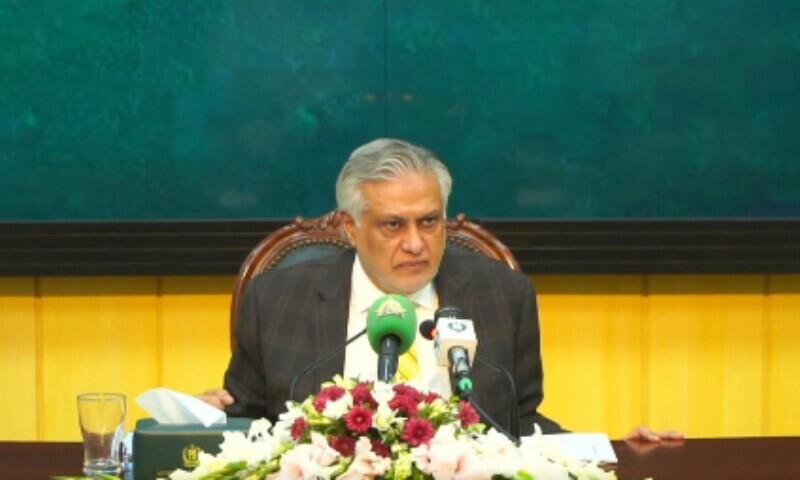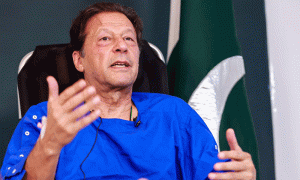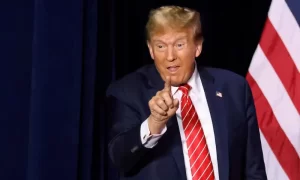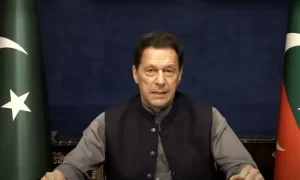
• Reiterates firm support for two-state solution to Israel-Palestine conflict
• Insists Trump’s Nobel nomination a joint civil-military decision
• Dismisses claim Islamabad sought ceasefire
ISLAMABAD: Foreign Minister Ishaq Dar on Friday ruled out the possibility of Pakistan joining the Abraham Accords, stating that such a move would effectively mean abandoning the country’s longstanding support for a two-state solution to the Palestinian conflict and recognising Israel.
Speaking at a news conference at the Foreign Office, Mr Dar, who also serves as deputy prime minister, reiterated Pakistan’s firm support for a two-state solution to the Israeli-Palestinian conflict.
His comments came in response to recent remarks by US Special Envoy for the Middle East Steve Witkoff, who suggested that more countries, which were not previously “contemplated”, were preparing to join the US-brokered accords, which normalise ties with Israel.
Witkoff had joined President Donald Trump at the White House lunch for Army Chief Field Marshal Asim Munir.
“We are not ready to recognise Israel until the two-state solution to the Palestine conflict is accepted,” Mr Dar said. “There is no change in our stated policy on the Palestine issue.”
He added that signing the Abraham Accords would be tantamount to abandoning Pakistan’s long-standing demand for a Palestinian state with Al-Quds Al-Sharif as its capital, based on pre-1967 borders. “Let it be clear to everyone that our seven-decades-long policy remains unchanged,” he said.
Trump’s Nobel nomination
Addressing criticism over Pakistan’s nomination of President Trump for the Nobel Peace Prize, Mr Dar said the decision was made jointly by the country’s civilian and military leadership.
He emphasised that the nomination, submitted prior to the start of the Israel-Iran conflict, was based on Trump’s role in de-escalating tensions between India and Pakistan and his remarks regarding the Kashmir dispute.
The foreign minister recalled that Trump “tweeted 15 or 16 times about that”.
Trump’s repeated claims on social media about his role in facilitating the May 10 ceasefire between Pakistan and India have irritated New Delhi.
“The decision to nominate President Trump for the Nobel Peace Prize was in the context of his role in the India-Pakistan conflict and his statements on the Kashmir issue,” Mr Dar said.
“It was a collective decision by the civil-military leadership. I signed the letter on June 11, days before the Iran-Israel war began. The prime minister’s approval was obviously part of the process.”
Mr Dar referred to Prime Minister Shehbaz Sharif’s remarks at a June 4 event at the US Embassy, where he reportedly called Trump “a man of peace”.
The nomination has stirred controversy within Pakistan, with many questioning the rationale behind the move.
Indian ceasefire claims
Responding to Indian officials’ statements that claimed Pakistan had sought a ceasefire, FM Dar dismissed the assertions and reiterated Islamabad’s position that dialogue must be based on equality.
“We didn’t ask anyone for a ceasefire, nor would we ask anyone for dialogue,” he said.
“If India wants talks, we are ready. But we are a dignified nation, we won’t beg. Pakistan is prepared to talk on all outstanding issues, including Kashmir and terrorism, at any venue, but in a respectful manner. The ball is in their court. It takes two to tango.”
His remarks directly challenge New Delhi’s narrative and reaffirm Pakistan’s readiness for dialogue grounded in mutual respect and national dignity.





